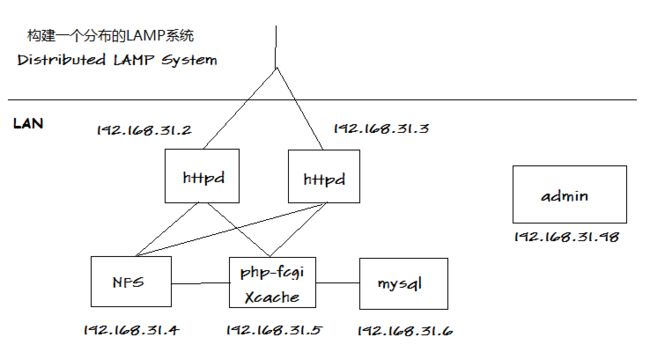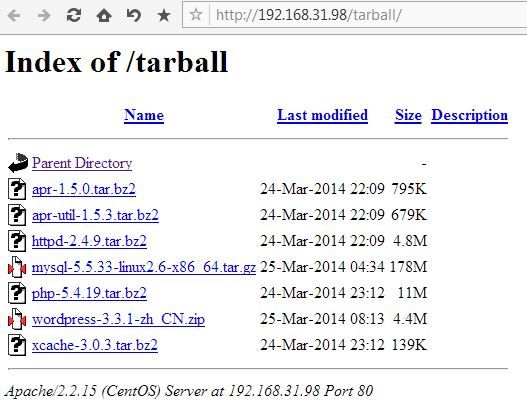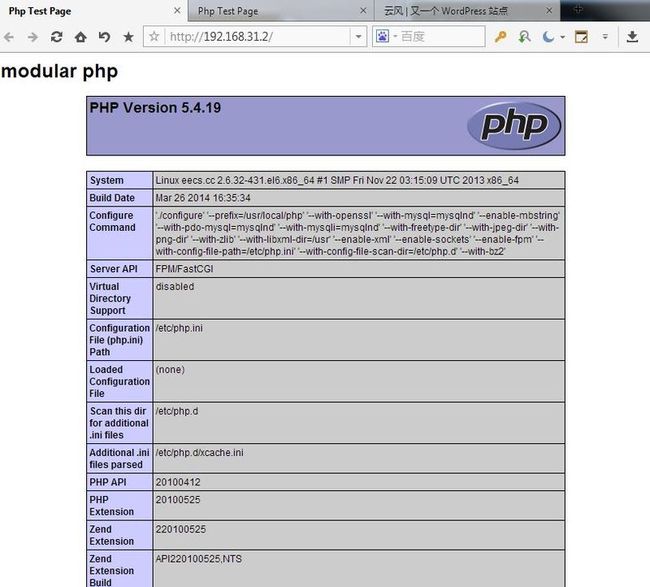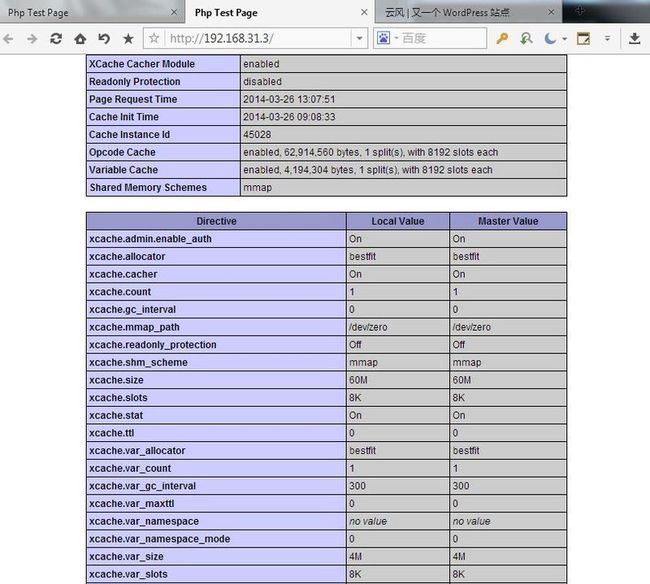构建一个分布的LAMP系统
系统鸟瞰如下图:

整个系统位于LAN:192.168.31.0/24之中,两台httpd服务器通过DNS系统共同分担客户请求,他们使用相同的配置,其DocumentRoot相同且均位于局域网内的另一台NFS服务器上,网页php脚本通过php-fcgi的方式解释执行,必要时,php将会访问局域网中的数据库服务器为网站提供数据库服务。
http服务器与php、Xcache将采用源码方式安装,NFS使用RPM方式安装,mysql使用官方发布的X86-64二进制包方式安装,事先,我们已经在admin主机192.168.31.98上架起了一个公共的http服务器,并将系统安装所需各压缩文件均放置在http://192.168.31.98/tarball/之下。
安装、配置两台HTTP服务器:
安装脚本如下:
install_http.sh
1 declare tempDir=`mktemp -d` 2 declare aprDir=/usr/local/apr 3 declare aprutilDir=/usr/local/apr-util 4 declare apacheDir=/usr/local/apache249 5 declare apacheConfDir=/etc/httpd249 6 7 hwclock -s 8 9 chmod 700 $tempDir ; chown root:root $tempDir ; cd $tempDir 10 11 #pcre-devel 12 yum install -y gcc* 13 yum groupinstall -y 'Desktop Platform Development' 14 #yum groupinstall -y 'Additional Development' 15 yum groupinstall -y 'Development tools' 16 yum groupinstall -y 'Server Platform Development' 17 yum install -y pcre 18 yum install -y pcre-devel 19 20 wget http://192.168.31.98/tarball/apr-1.5.0.tar.bz2 21 wget http://192.168.31.98/tarball/apr-util-1.5.3.tar.bz2 22 wget http://192.168.31.98/tarball/httpd-2.4.9.tar.bz2 23 24 tar xf apr-1.5.0.tar.bz2 25 cd apr-1.5.0 26 ./configure --prefix=${aprDir} 27 make 28 make install 29 cd .. 30 rm -fr apr-1.5.0 31 32 tar xf apr-util-1.5.3.tar.bz2 33 cd apr-util-1.5.3 34 ./configure --prefix=${aprutilDir} --with-apr=${aprDir} 35 make 36 make install 37 cd .. 38 rm -fr apr-util-1.5.3 39 40 yum install -y openssl openssl-devel 41 42 tar xf httpd-2.4.9.tar.bz2 43 cd httpd-2.4.9 44 ./configure --prefix=$apacheDir --sysconfdir=$apacheConfDir --enable-so --enable-ssl \ 45 --enable-cgi --enable-rewrite --with-zlib --with-pcre --with-apr=$aprDir \ 46 --with-apr-util=$aprutilDir --enable-modules=most --enable-mpms-shared=all \ 47 --with-mpm=event --enable-proxy-fcgi 48 make 49 make install 50 cd .. 51 rm -fr httpd-2.4.9 52 53 cd 54 rm -fr $tempDir 55 56 # mamange the /etc/init.d/httpd249 scripts 57 # chkconfig --add httpd249
分别在192.168.31.2与192.168.31.3上用bash解释执行install_http.sh脚本。然后将httpd添加入系统服务。
/etc/rc.d/init.d/httpd249 #这里直接修改自原httpd的service脚本
1 #!/bin/bash 2 # 3 # httpd Startup script for the Apache HTTP Server 4 # 5 # chkconfig: - 85 15 6 # description: The Apache HTTP Server is an efficient and extensible \ 7 # server implementing the current HTTP standards. 8 # processname: httpd 9 # config: /etc/httpd/conf/httpd.conf 10 # config: /etc/sysconfig/httpd 11 # pidfile: /var/run/httpd/httpd.pid 12 # 13 ### BEGIN INIT INFO 14 # Provides: httpd 15 # Required-Start: $local_fs $remote_fs $network $named 16 # Required-Stop: $local_fs $remote_fs $network 17 # Should-Start: distcache 18 # Short-Description: start and stop Apache HTTP Server 19 # Description: The Apache HTTP Server is an extensible server 20 # implementing the current HTTP standards. 21 ### END INIT INFO 22 23 # Source function library. 24 . /etc/rc.d/init.d/functions 25 26 if [ -f /etc/sysconfig/httpd ]; then 27 . /etc/sysconfig/httpd 28 fi 29 30 # Start httpd in the C locale by default. 31 HTTPD_LANG=${HTTPD_LANG-"C"} 32 33 # This will prevent initlog from swallowing up a pass-phrase prompt if 34 # mod_ssl needs a pass-phrase from the user. 35 INITLOG_ARGS="" 36 37 # Set HTTPD=/usr/sbin/httpd.worker in /etc/sysconfig/httpd to use a server 38 # with the thread-based "worker" MPM; BE WARNED that some modules may not 39 # work correctly with a thread-based MPM; notably PHP will refuse to start. 40 41 # Path to the apachectl script, server binary, and short-form for messages. 42 apachectl=/usr/local/apache249/bin/apachectl 43 httpd=${HTTPD-/usr/local/apache249/bin/httpd} 44 prog=httpd 45 pidfile=${PIDFILE-/var/run/httpd/httpd.pid} 46 lockfile=${LOCKFILE-/var/lock/subsys/httpd} 47 RETVAL=0 48 STOP_TIMEOUT=${STOP_TIMEOUT-10} 49 50 # The semantics of these two functions differ from the way apachectl does 51 # things -- attempting to start while running is a failure, and shutdown 52 # when not running is also a failure. So we just do it the way init scripts 53 # are expected to behave here. 54 start() { 55 echo -n $"Starting $prog: " 56 LANG=$HTTPD_LANG daemon --pidfile=${pidfile} $httpd $OPTIONS 57 RETVAL=$? 58 echo 59 [ $RETVAL = 0 ] && touch ${lockfile} 60 return $RETVAL 61 } 62 63 # When stopping httpd, a delay (of default 10 second) is required 64 # before SIGKILLing the httpd parent; this gives enough time for the 65 # httpd parent to SIGKILL any errant children. 66 stop() { 67 echo -n $"Stopping $prog: " 68 killproc -p ${pidfile} -d ${STOP_TIMEOUT} $httpd 69 RETVAL=$? 70 echo 71 [ $RETVAL = 0 ] && rm -f ${lockfile} ${pidfile} 72 } 73 reload() { 74 echo -n $"Reloading $prog: " 75 if ! LANG=$HTTPD_LANG $httpd $OPTIONS -t >&/dev/null; then 76 RETVAL=6 77 echo $"not reloading due to configuration syntax error" 78 failure $"not reloading $httpd due to configuration syntax error" 79 else 80 # Force LSB behaviour from killproc 81 LSB=1 killproc -p ${pidfile} $httpd -HUP 82 RETVAL=$? 83 if [ $RETVAL -eq 7 ]; then 84 failure $"httpd shutdown" 85 fi 86 fi 87 echo 88 } 89 90 # See how we were called. 91 case "$1" in 92 start) 93 start 94 ;; 95 stop) 96 stop 97 ;; 98 status) 99 status -p ${pidfile} $httpd 100 RETVAL=$? 101 ;; 102 restart) 103 stop 104 start 105 ;; 106 condrestart|try-restart) 107 if status -p ${pidfile} $httpd >&/dev/null; then 108 stop 109 start 110 fi 111 ;; 112 force-reload|reload) 113 reload 114 ;; 115 graceful|help|configtest|fullstatus) 116 $apachectl $@ 117 RETVAL=$? 118 ;; 119 *) 120 echo $"Usage: $prog {start|stop|restart|condrestart|try-restart|force-reload|reload|status|fullstatus|graceful|help|configtest}" 121 RETVAL=2 122 esac 123 124 exit $RETVAL
/etc/httpd249/httpd.conf #####主要修改部分如下 #PidFile /var/run/httpd/httpd.pid #LoadModule proxy_module modules/mod_proxy.so #LoadModule proxy_fcgi_module modules/mod_proxy_fcgi.so #DocumentRoot "/www/nfs" #ProxyRequests Off #ProxyPassMatch ^/(.*\.php)$ #fcgi://192.168.31.5:9000/www/nfs/$1 #AddType application/x-httpd-php .php #AddType application/x-httpd-php-source .phps #<Directory "/www/nfs"> # Options none # AllowOverride None # Require all granted #</Directory> #<IfModule dir_module> # DirectoryIndex index.php index.html #</IfModule>
1 # This is the main Apache HTTP server configuration file. It contains the 2 # configuration directives that give the server its instructions. 3 # See <URL:http://httpd.apache.org/docs/2.4/> for detailed information. 4 # In particular, see 5 # <URL:http://httpd.apache.org/docs/2.4/mod/directives.html> 6 # for a discussion of each configuration directive. 7 # 8 # Do NOT simply read the instructions in here without understanding 9 # what they do. They're here only as hints or reminders. If you are unsure 10 # consult the online docs. You have been warned. 11 # 12 # Configuration and logfile names: If the filenames you specify for many 13 # of the server's control files begin with "/" (or "drive:/" for Win32), the 14 # server will use that explicit path. If the filenames do *not* begin 15 # with "/", the value of ServerRoot is prepended -- so "logs/access_log" 16 # with ServerRoot set to "/usr/local/apache2" will be interpreted by the 17 # server as "/usr/local/apache2/logs/access_log", whereas "/logs/access_log" 18 # will be interpreted as '/logs/access_log'. 19 20 # 21 # ServerRoot: The top of the directory tree under which the server's 22 # configuration, error, and log files are kept. 23 # 24 # Do not add a slash at the end of the directory path. If you point 25 # ServerRoot at a non-local disk, be sure to specify a local disk on the 26 # Mutex directive, if file-based mutexes are used. If you wish to share the 27 # same ServerRoot for multiple httpd daemons, you will need to change at 28 # least PidFile. 29 # 30 ServerRoot "/usr/local/apache249" 31 PidFile /var/run/httpd/httpd.pid 32 # 33 # Mutex: Allows you to set the mutex mechanism and mutex file directory 34 # for individual mutexes, or change the global defaults 35 # 36 # Uncomment and change the directory if mutexes are file-based and the default 37 # mutex file directory is not on a local disk or is not appropriate for some 38 # other reason. 39 # 40 # Mutex default:logs 41 42 # 43 # Listen: Allows you to bind Apache to specific IP addresses and/or 44 # ports, instead of the default. See also the <VirtualHost> 45 # directive. 46 # 47 # Change this to Listen on specific IP addresses as shown below to 48 # prevent Apache from glomming onto all bound IP addresses. 49 # 50 #Listen 12.34.56.78:80 51 Listen 80 52 53 # 54 # Dynamic Shared Object (DSO) Support 55 # 56 # To be able to use the functionality of a module which was built as a DSO you 57 # have to place corresponding `LoadModule' lines at this location so the 58 # directives contained in it are actually available _before_ they are used. 59 # Statically compiled modules (those listed by `httpd -l') do not need 60 # to be loaded here. 61 # 62 # Example: 63 # LoadModule foo_module modules/mod_foo.so 64 # 65 LoadModule authn_file_module modules/mod_authn_file.so 66 #LoadModule authn_dbm_module modules/mod_authn_dbm.so 67 #LoadModule authn_anon_module modules/mod_authn_anon.so 68 #LoadModule authn_dbd_module modules/mod_authn_dbd.so 69 #LoadModule authn_socache_module modules/mod_authn_socache.so 70 LoadModule authn_core_module modules/mod_authn_core.so 71 LoadModule authz_host_module modules/mod_authz_host.so 72 LoadModule authz_groupfile_module modules/mod_authz_groupfile.so 73 LoadModule authz_user_module modules/mod_authz_user.so 74 #LoadModule authz_dbm_module modules/mod_authz_dbm.so 75 #LoadModule authz_owner_module modules/mod_authz_owner.so 76 #LoadModule authz_dbd_module modules/mod_authz_dbd.so 77 LoadModule authz_core_module modules/mod_authz_core.so 78 LoadModule access_compat_module modules/mod_access_compat.so 79 LoadModule auth_basic_module modules/mod_auth_basic.so 80 #LoadModule auth_form_module modules/mod_auth_form.so 81 #LoadModule auth_digest_module modules/mod_auth_digest.so 82 #LoadModule allowmethods_module modules/mod_allowmethods.so 83 #LoadModule file_cache_module modules/mod_file_cache.so 84 #LoadModule cache_module modules/mod_cache.so 85 #LoadModule cache_disk_module modules/mod_cache_disk.so 86 #LoadModule cache_socache_module modules/mod_cache_socache.so 87 #LoadModule socache_shmcb_module modules/mod_socache_shmcb.so 88 #LoadModule socache_dbm_module modules/mod_socache_dbm.so 89 #LoadModule socache_memcache_module modules/mod_socache_memcache.so 90 #LoadModule macro_module modules/mod_macro.so 91 #LoadModule dbd_module modules/mod_dbd.so 92 #LoadModule dumpio_module modules/mod_dumpio.so 93 #LoadModule buffer_module modules/mod_buffer.so 94 #LoadModule ratelimit_module modules/mod_ratelimit.so 95 LoadModule reqtimeout_module modules/mod_reqtimeout.so 96 #LoadModule ext_filter_module modules/mod_ext_filter.so 97 #LoadModule request_module modules/mod_request.so 98 #LoadModule include_module modules/mod_include.so 99 LoadModule filter_module modules/mod_filter.so 100 #LoadModule substitute_module modules/mod_substitute.so 101 #LoadModule sed_module modules/mod_sed.so 102 #LoadModule deflate_module modules/mod_deflate.so 103 LoadModule mime_module modules/mod_mime.so 104 LoadModule log_config_module modules/mod_log_config.so 105 #LoadModule log_debug_module modules/mod_log_debug.so 106 #LoadModule logio_module modules/mod_logio.so 107 LoadModule env_module modules/mod_env.so 108 #LoadModule expires_module modules/mod_expires.so 109 LoadModule headers_module modules/mod_headers.so 110 #LoadModule unique_id_module modules/mod_unique_id.so 111 LoadModule setenvif_module modules/mod_setenvif.so 112 LoadModule version_module modules/mod_version.so 113 #LoadModule remoteip_module modules/mod_remoteip.so 114 LoadModule proxy_module modules/mod_proxy.so 115 #LoadModule proxy_connect_module modules/mod_proxy_connect.so 116 #LoadModule proxy_ftp_module modules/mod_proxy_ftp.so 117 #LoadModule proxy_http_module modules/mod_proxy_http.so 118 LoadModule proxy_fcgi_module modules/mod_proxy_fcgi.so 119 #LoadModule proxy_scgi_module modules/mod_proxy_scgi.so 120 #LoadModule proxy_wstunnel_module modules/mod_proxy_wstunnel.so 121 #LoadModule proxy_ajp_module modules/mod_proxy_ajp.so 122 #LoadModule proxy_balancer_module modules/mod_proxy_balancer.so 123 #LoadModule proxy_express_module modules/mod_proxy_express.so 124 #LoadModule session_module modules/mod_session.so 125 #LoadModule session_cookie_module modules/mod_session_cookie.so 126 #LoadModule session_dbd_module modules/mod_session_dbd.so 127 #LoadModule slotmem_shm_module modules/mod_slotmem_shm.so 128 #LoadModule ssl_module modules/mod_ssl.so 129 #LoadModule lbmethod_byrequests_module modules/mod_lbmethod_byrequests.so 130 #LoadModule lbmethod_bytraffic_module modules/mod_lbmethod_bytraffic.so 131 #LoadModule lbmethod_bybusyness_module modules/mod_lbmethod_bybusyness.so 132 #LoadModule lbmethod_heartbeat_module modules/mod_lbmethod_heartbeat.so 133 LoadModule mpm_event_module modules/mod_mpm_event.so 134 LoadModule unixd_module modules/mod_unixd.so 135 #LoadModule dav_module modules/mod_dav.so 136 LoadModule status_module modules/mod_status.so 137 LoadModule autoindex_module modules/mod_autoindex.so 138 #LoadModule info_module modules/mod_info.so 139 #LoadModule cgid_module modules/mod_cgid.so 140 #LoadModule cgi_module modules/mod_cgi.so 141 #LoadModule dav_fs_module modules/mod_dav_fs.so 142 #LoadModule vhost_alias_module modules/mod_vhost_alias.so 143 #LoadModule negotiation_module modules/mod_negotiation.so 144 LoadModule dir_module modules/mod_dir.so 145 #LoadModule actions_module modules/mod_actions.so 146 #LoadModule speling_module modules/mod_speling.so 147 #LoadModule userdir_module modules/mod_userdir.so 148 LoadModule alias_module modules/mod_alias.so 149 #LoadModule rewrite_module modules/mod_rewrite.so 150 151 <IfModule unixd_module> 152 # 153 # If you wish httpd to run as a different user or group, you must run 154 # httpd as root initially and it will switch. 155 # 156 # User/Group: The name (or #number) of the user/group to run httpd as. 157 # It is usually good practice to create a dedicated user and group for 158 # running httpd, as with most system services. 159 # 160 User daemon 161 Group daemon 162 163 </IfModule> 164 165 # 'Main' server configuration 166 # 167 # The directives in this section set up the values used by the 'main' 168 # server, which responds to any requests that aren't handled by a 169 # <VirtualHost> definition. These values also provide defaults for 170 # any <VirtualHost> containers you may define later in the file. 171 # 172 # All of these directives may appear inside <VirtualHost> containers, 173 # in which case these default settings will be overridden for the 174 # virtual host being defined. 175 # 176 177 # 178 # ServerAdmin: Your address, where problems with the server should be 179 # e-mailed. This address appears on some server-generated pages, such 180 # as error documents. e.g. admin@your-domain.com 181 # 182 ServerAdmin [email protected] 183 184 # 185 # ServerName gives the name and port that the server uses to identify itself. 186 # This can often be determined automatically, but we recommend you specify 187 # it explicitly to prevent problems during startup. 188 # 189 # If your host doesn't have a registered DNS name, enter its IP address here. 190 # 191 #ServerName www.example.com:80 192 193 # 194 # Deny access to the entirety of your server's filesystem. You must 195 # explicitly permit access to web content directories in other 196 # <Directory> blocks below. 197 # 198 <Directory /> 199 AllowOverride none 200 Require all denied 201 </Directory> 202 203 # 204 # Note that from this point forward you must specifically allow 205 # particular features to be enabled - so if something's not working as 206 # you might expect, make sure that you have specifically enabled it 207 # below. 208 # 209 210 # 211 # DocumentRoot: The directory out of which you will serve your 212 # documents. By default, all requests are taken from this directory, but 213 # symbolic links and aliases may be used to point to other locations. 214 # 215 DocumentRoot "/www/nfs" 216 ProxyRequests Off 217 ProxyPassMatch ^/(.*\.php)$ fcgi://192.168.31.5:9000/www/nfs/$1 218 AddType application/x-httpd-php .php 219 AddType application/x-httpd-php-source .phps 220 <Directory "/www/nfs"> 221 # 222 # Possible values for the Options directive are "None", "All", 223 # or any combination of: 224 # Indexes Includes FollowSymLinks SymLinksifOwnerMatch ExecCGI MultiViews 225 # 226 # Note that "MultiViews" must be named *explicitly* --- "Options All" 227 # doesn't give it to you. 228 # 229 # The Options directive is both complicated and important. Please see 230 # http://httpd.apache.org/docs/2.4/mod/core.html#options 231 # for more information. 232 # 233 Options none 234 # 235 # AllowOverride controls what directives may be placed in .htaccess files. 236 # It can be "All", "None", or any combination of the keywords: 237 # AllowOverride FileInfo AuthConfig Limit 238 # 239 AllowOverride None 240 241 # 242 # Controls who can get stuff from this server. 243 # 244 Require all granted 245 </Directory> 246 247 <Directory "/usr/local/apache249/htdocs"> 248 # 249 # Possible values for the Options directive are "None", "All", 250 # or any combination of: 251 # Indexes Includes FollowSymLinks SymLinksifOwnerMatch ExecCGI MultiViews 252 # 253 # Note that "MultiViews" must be named *explicitly* --- "Options All" 254 # doesn't give it to you. 255 # 256 # The Options directive is both complicated and important. Please see 257 # http://httpd.apache.org/docs/2.4/mod/core.html#options 258 # for more information. 259 # 260 Options Indexes FollowSymLinks 261 262 # 263 # AllowOverride controls what directives may be placed in .htaccess files. 264 # It can be "All", "None", or any combination of the keywords: 265 # AllowOverride FileInfo AuthConfig Limit 266 # 267 AllowOverride None 268 269 # 270 # Controls who can get stuff from this server. 271 # 272 Require all granted 273 </Directory> 274 275 # 276 # DirectoryIndex: sets the file that Apache will serve if a directory 277 # is requested. 278 # 279 <IfModule dir_module> 280 DirectoryIndex index.php index.html 281 </IfModule> 282 283 # 284 # The following lines prevent .htaccess and .htpasswd files from being 285 # viewed by Web clients. 286 # 287 <Files ".ht*"> 288 Require all denied 289 </Files> 290 291 # 292 # ErrorLog: The location of the error log file. 293 # If you do not specify an ErrorLog directive within a <VirtualHost> 294 # container, error messages relating to that virtual host will be 295 # logged here. If you *do* define an error logfile for a <VirtualHost> 296 # container, that host's errors will be logged there and not here. 297 # 298 ErrorLog "logs/error_log" 299 300 # 301 # LogLevel: Control the number of messages logged to the error_log. 302 # Possible values include: debug, info, notice, warn, error, crit, 303 # alert, emerg. 304 # 305 LogLevel warn 306 307 <IfModule log_config_module> 308 # 309 # The following directives define some format nicknames for use with 310 # a CustomLog directive (see below). 311 # 312 LogFormat "%h %l %u %t \"%r\" %>s %b \"%{Referer}i\" \"%{User-Agent}i\"" combined 313 LogFormat "%h %l %u %t \"%r\" %>s %b" common 314 315 <IfModule logio_module> 316 # You need to enable mod_logio.c to use %I and %O 317 LogFormat "%h %l %u %t \"%r\" %>s %b \"%{Referer}i\" \"%{User-Agent}i\" %I %O" combinedio 318 </IfModule> 319 320 # 321 # The location and format of the access logfile (Common Logfile Format). 322 # If you do not define any access logfiles within a <VirtualHost> 323 # container, they will be logged here. Contrariwise, if you *do* 324 # define per-<VirtualHost> access logfiles, transactions will be 325 # logged therein and *not* in this file. 326 # 327 CustomLog "logs/access_log" common 328 329 # 330 # If you prefer a logfile with access, agent, and referer information 331 # (Combined Logfile Format) you can use the following directive. 332 # 333 #CustomLog "logs/access_log" combined 334 </IfModule> 335 336 <IfModule alias_module> 337 # 338 # Redirect: Allows you to tell clients about documents that used to 339 # exist in your server's namespace, but do not anymore. The client 340 # will make a new request for the document at its new location. 341 # Example: 342 # Redirect permanent /foo http://www.example.com/bar 343 344 # 345 # Alias: Maps web paths into filesystem paths and is used to 346 # access content that does not live under the DocumentRoot. 347 # Example: 348 # Alias /webpath /full/filesystem/path 349 # 350 # If you include a trailing / on /webpath then the server will 351 # require it to be present in the URL. You will also likely 352 # need to provide a <Directory> section to allow access to 353 # the filesystem path. 354 355 # 356 # ScriptAlias: This controls which directories contain server scripts. 357 # ScriptAliases are essentially the same as Aliases, except that 358 # documents in the target directory are treated as applications and 359 # run by the server when requested rather than as documents sent to the 360 # client. The same rules about trailing "/" apply to ScriptAlias 361 # directives as to Alias. 362 # 363 ScriptAlias /cgi-bin/ "/usr/local/apache249/cgi-bin/" 364 365 </IfModule> 366 367 <IfModule cgid_module> 368 # 369 # ScriptSock: On threaded servers, designate the path to the UNIX 370 # socket used to communicate with the CGI daemon of mod_cgid. 371 # 372 #Scriptsock cgisock 373 </IfModule> 374 375 # 376 # "/usr/local/apache249/cgi-bin" should be changed to whatever your ScriptAliased 377 # CGI directory exists, if you have that configured. 378 # 379 <Directory "/usr/local/apache249/cgi-bin"> 380 AllowOverride None 381 Options None 382 Require all granted 383 </Directory> 384 385 <IfModule mime_module> 386 # 387 # TypesConfig points to the file containing the list of mappings from 388 # filename extension to MIME-type. 389 # 390 TypesConfig /etc/httpd249/mime.types 391 392 # 393 # AddType allows you to add to or override the MIME configuration 394 # file specified in TypesConfig for specific file types. 395 # 396 #AddType application/x-gzip .tgz 397 # 398 # AddEncoding allows you to have certain browsers uncompress 399 # information on the fly. Note: Not all browsers support this. 400 # 401 #AddEncoding x-compress .Z 402 #AddEncoding x-gzip .gz .tgz 403 # 404 # If the AddEncoding directives above are commented-out, then you 405 # probably should define those extensions to indicate media types: 406 # 407 AddType application/x-compress .Z 408 AddType application/x-gzip .gz .tgz 409 410 # 411 # AddHandler allows you to map certain file extensions to "handlers": 412 # actions unrelated to filetype. These can be either built into the server 413 # or added with the Action directive (see below) 414 # 415 # To use CGI scripts outside of ScriptAliased directories: 416 # (You will also need to add "ExecCGI" to the "Options" directive.) 417 # 418 #AddHandler cgi-script .cgi 419 420 # For type maps (negotiated resources): 421 #AddHandler type-map var 422 423 # 424 # Filters allow you to process content before it is sent to the client. 425 # 426 # To parse .shtml files for server-side includes (SSI): 427 # (You will also need to add "Includes" to the "Options" directive.) 428 # 429 #AddType text/html .shtml 430 #AddOutputFilter INCLUDES .shtml 431 </IfModule> 432 433 # 434 # The mod_mime_magic module allows the server to use various hints from the 435 # contents of the file itself to determine its type. The MIMEMagicFile 436 # directive tells the module where the hint definitions are located. 437 # 438 #MIMEMagicFile /etc/httpd249/magic 439 440 # 441 # Customizable error responses come in three flavors: 442 # 1) plain text 2) local redirects 3) external redirects 443 # 444 # Some examples: 445 #ErrorDocument 500 "The server made a boo boo." 446 #ErrorDocument 404 /missing.html 447 #ErrorDocument 404 "/cgi-bin/missing_handler.pl" 448 #ErrorDocument 402 http://www.example.com/subscription_info.html 449 # 450 451 # 452 # MaxRanges: Maximum number of Ranges in a request before 453 # returning the entire resource, or one of the special 454 # values 'default', 'none' or 'unlimited'. 455 # Default setting is to accept 200 Ranges. 456 #MaxRanges unlimited 457 458 # 459 # EnableMMAP and EnableSendfile: On systems that support it, 460 # memory-mapping or the sendfile syscall may be used to deliver 461 # files. This usually improves server performance, but must 462 # be turned off when serving from networked-mounted 463 # filesystems or if support for these functions is otherwise 464 # broken on your system. 465 # Defaults: EnableMMAP On, EnableSendfile Off 466 # 467 #EnableMMAP off 468 #EnableSendfile on 469 470 # Supplemental configuration 471 # 472 # The configuration files in the /etc/httpd249/extra/ directory can be 473 # included to add extra features or to modify the default configuration of 474 # the server, or you may simply copy their contents here and change as 475 # necessary. 476 477 # Server-pool management (MPM specific) 478 #Include /etc/httpd249/extra/httpd-mpm.conf 479 480 # Multi-language error messages 481 #Include /etc/httpd249/extra/httpd-multilang-errordoc.conf 482 483 # Fancy directory listings 484 #Include /etc/httpd249/extra/httpd-autoindex.conf 485 486 # Language settings 487 #Include /etc/httpd249/extra/httpd-languages.conf 488 489 # User home directories 490 #Include /etc/httpd249/extra/httpd-userdir.conf 491 492 # Real-time info on requests and configuration 493 #Include /etc/httpd249/extra/httpd-info.conf 494 495 # Virtual hosts 496 #Include /etc/httpd249/extra/httpd-vhosts.conf 497 498 # Local access to the Apache HTTP Server Manual 499 #Include /etc/httpd249/extra/httpd-manual.conf 500 501 # Distributed authoring and versioning (WebDAV) 502 #Include /etc/httpd249/extra/httpd-dav.conf 503 504 # Various default settings 505 #Include /etc/httpd249/extra/httpd-default.conf 506 507 # Configure mod_proxy_html to understand HTML4/XHTML1 508 <IfModule proxy_html_module> 509 Include /etc/httpd249/extra/proxy-html.conf 510 </IfModule> 511 512 # Secure (SSL/TLS) connections 513 #Include /etc/httpd249/extra/httpd-ssl.conf 514 # 515 # Note: The following must must be present to support 516 # starting without SSL on platforms with no /dev/random equivalent 517 # but a statically compiled-in mod_ssl. 518 # 519 <IfModule ssl_module> 520 SSLRandomSeed startup builtin 521 SSLRandomSeed connect builtin 522 </IfModule> 523 # 524 # uncomment out the below to deal with user agents that deliberately 525 # violate open standards by misusing DNT (DNT *must* be a specific 526 # end-user choice) 527 # 528 #<IfModule setenvif_module> 529 #BrowserMatch "MSIE 10.0;" bad_DNT 530 #</IfModule> 531 #<IfModule headers_module> 532 #RequestHeader unset DNT env=bad_DNT 533 #</IfModule>
使用ssh同步两台主机上的系统服务脚本与主配置文件
scp httpd249 root@192.168.31.2:/etc/init.d/httpd249 scp httpd249 root@192.168.31.3:/etc/init.d/httpd249 scp httpd.conf root@192.168.31.2:/etc/httpd249/httpd.conf scp httpd.conf root@192.168.31.3:/etc/httpd249/httpd.conf
安装、配置NFS服务器:
yum install -y nfs-utils portmap mkdir -pv /www/nfs echo '/www/nfs 192.168.31.0/24(rw,all_squash,anonuid=501,anongid=501)' > /etc/exports service rpcbind start service nfs start
安装、配置php-fcgi与Xcache服务器:
install_php.sh
1 declare phpDir=/usr/local/php 2 declare tempDir=`mktemp -d` 3 4 chmod 700 $tempDir ; chown root:root $tempDir ; cd $tempDir 5 6 hwclock -s 7 yum repolist all;echo $? 8 if ! yum grouplist 9 then 10 echo "yum repo error:disabled :(" 11 exit 1 12 fi 13 #pcre-devel 14 yum install -y gcc* 15 yum groupinstall -y 'Desktop Platform Development' 16 #yum groupinstall -y 'Additional Development' 17 yum groupinstall -y 'Development tools' 18 yum groupinstall -y 'Server Platform Development' 19 yum install -y openssl* 20 yum install -y bzip2-devel 21 22 wget http://192.168.31.98/tarball/php-5.4.19.tar.bz2 23 wget http://192.168.31.98/tarball/xcache-3.0.3.tar.bz2 24 25 tar xf php-5.4.19.tar.bz2 26 tar xf xcache-3.0.3.tar.bz2 27 28 cd php-5.4.19 29 30 ./configure --prefix=$phpDir --with-openssl --with-mysql=mysqlnd --enable-mbstring \ 31 --with-pdo-mysql=mysqlnd --with-mysqli=mysqlnd --with-freetype-dir --with-jpeg-dir \ 32 --with-png-dir --with-zlib --with-libxml-dir=/usr --enable-xml --enable-sockets \ 33 --enable-fpm --with-config-file-path=/etc/php.ini \ 34 --with-config-file-scan-dir=/etc/php.d --with-bz2 35 ##--with-mcrypt 36 make 37 make install 38 /bin/cp -f php.ini-production /etc/php.ini 39 /bin/cp -f sapi/fpm/init.d.php-fpm /etc/rc.d/init.d/php-fpm 40 chmod +x /etc/rc.d/init.d/php-fpm 41 chkconfig --add php-fpm 42 #chkconfig php-fpm on 43 /bin/cp -f $phpDir/etc/php-fpm.conf.default $phpDir/etc/php-fpm.conf 44 45 cd ../xcache-3.0.3 46 $phpDir/bin/phpize 47 ./configure --enable-xcache --with-php-config=$phpDir/bin/php-config 48 make && make install 49 50 51 mkdir /etc/php.d 52 cp xcache.ini /etc/php.d 53 54 cd 55 56 rm -fr $tempDir
在192.168.31.5机器上执行php-fcgi与Xcache的安装脚本
配置php fpm(即fcgi服务的参数):
vim /usr/local/php/etc/php-fpm.conf ###### listen = 9000 pm.max_children = 50 pm.start_servers = 5 pm.min_spare_servers = 2 pm.max_spare_servers = 8 pid = /usr/local/php/var/run/php-fpm.pid ###### :wq
启动面向整个网络的php-fcgi服务:
service php-fpm start ss -tlnp | grep php-fpm
安装、配置MySQL数据库服务器:
mkdir -pv /mysql/data1 ###new LVM pvcreate -y /dev/sdc vgcreate -s 16M mysqlvg /dev/sdc vgchange -a y mysqlvg lvcreate -L 8192M -n lv1 mysqlvg mkfs -t ext4 /dev/mysqlvg/lv1 mount /dev/mysqlvg/lv1 /mysql/data1 vi /etc/fstab #/dev/mysqlvg/lv1 /mysql/data1/ ext4 defaults 1 2 :wq df -TH ###mysql user groupadd -r mysql useradd -g mysql -r -s /sbin/nologin -M -d /mysql/data1 mysql chown -R mysql:mysql /mysql/data1 ### cd /usr/local wget http://192.168.31.98/tarball/mysql-5.5.33-linux2.6-x86_64.tar.gz tar xf mysql-5.5.33-linux2.6-x86_64.tar.gz ln -sv mysql-5.5.33-linux2.6-x86_64 mysql
rm -f mysql-5.5.33-linux2.6-x86_64.tar.gz cd mysql chown -R mysql:mysql . scripts/mysql_install_db --user=mysql --datadir=/mysql/data1 chown -R root . cp support-files/my-large.cnf /etc/my.cnf vim /etc/my.cnf #thread_concurrency = 2 #CPUs*2 #datadir = /mydata/data #:wq cp support-files/mysql.server /etc/rc.d/init.d/mysqld chmod +x /etc/rc.d/init.d/mysqld chkconfig --add mysqld cd
#配置PATH...
#配置ldconfig...
#配置man...
#配置头文件... service mysqld start mysql
本地登入MySQL,新建一数据库供WEB服务使用,并授权给php-fcgi服务器。
###快速新建、授权 USE mysql; SELECT user,host,password from user; UPDATE user SET password=PASSWORD('yunfeng') WHERE user='root'; CREATE DATABASE IF NOT EXISTS web_db1; GRANT ALL PRIVILEGES ON web_db1.* TO 'web'@'192.168.31.5' IDENTIFIED BY 'yunfeng'; FLUSH PRIVILEGES;
全局配置、启动:
在主机192.168.31.98上,我们将使用文章《使用ssh client与bash scripts轻松管理多台主机》中所开发的工具,对所有主机进行管理。
vim SlaveServer.conf #glServerList="192.168.31.2 \ # 192.168.31.3 \ # 192.168.31.4 \ # 192.168.31.5 \ # 192.168.31.6 \ # 192.168.31.98" #:wq bash RSAPublicKeyBroadCast.sh 3198 #建立公钥认证环境 bash CommandBroadCast.sh 3198 'mkdir -pv /www/nfs' bash CommandBroadCast.sh 3198 'yum install -y nfs-utils portmap' bash CommandBroadCast.sh 3198 'mount 192.168.31.4:/www/nfs /www/nfs' ###这里如果我们使用并行的方式效果会更好 以后我们会更新这个工具的功能 echo "nice to meet you :)" > /www/nfs/index.html vim /www/nfs/index.php <html> <head> <title>Php Test Page</title> </head> <body> <h1> modular php </h1> <?php phpinfo(); ?> </body> </html> #:wq ssh -p 3198 root@192.168.31.2 "/etc/init.d/httpd249 start" ssh -p 3198 root@192.168.31.3 "/etc/init.d/httpd249 start"
现在我们的系统已经运行起来,接下来更进一步。
配置、安装WordPress:
cd /www/nfs mkdir wdp wget http://192.168.31.98/tarball/wordpress-3.3.1-zh_CN.zip unzip wordpress-3.3.1-zh_CN.zip mv wordpress-3.3.1-zh_CN.zip/* wdp/ rm -fr wordpress* cd wdp cp wp-config-sample.php wp-config.php vim wp-config.php ### define('DB_NAME', 'web_db1'); define('DB_USER', 'web'); define('DB_PASSWORD', 'yunfeng'); define('DB_HOST', '192.168.31.6'); ### :wq
现在使用浏览器访问http://192.168.31.2/wdp/或者http://192.168.31.3/wdp/进行初始化WordPress吧!
附录:
我们的系统:
WordPress:
由于时间仓促,文章有几分凌乱。如有不清晰或者错误的地方,欢迎讨论!




